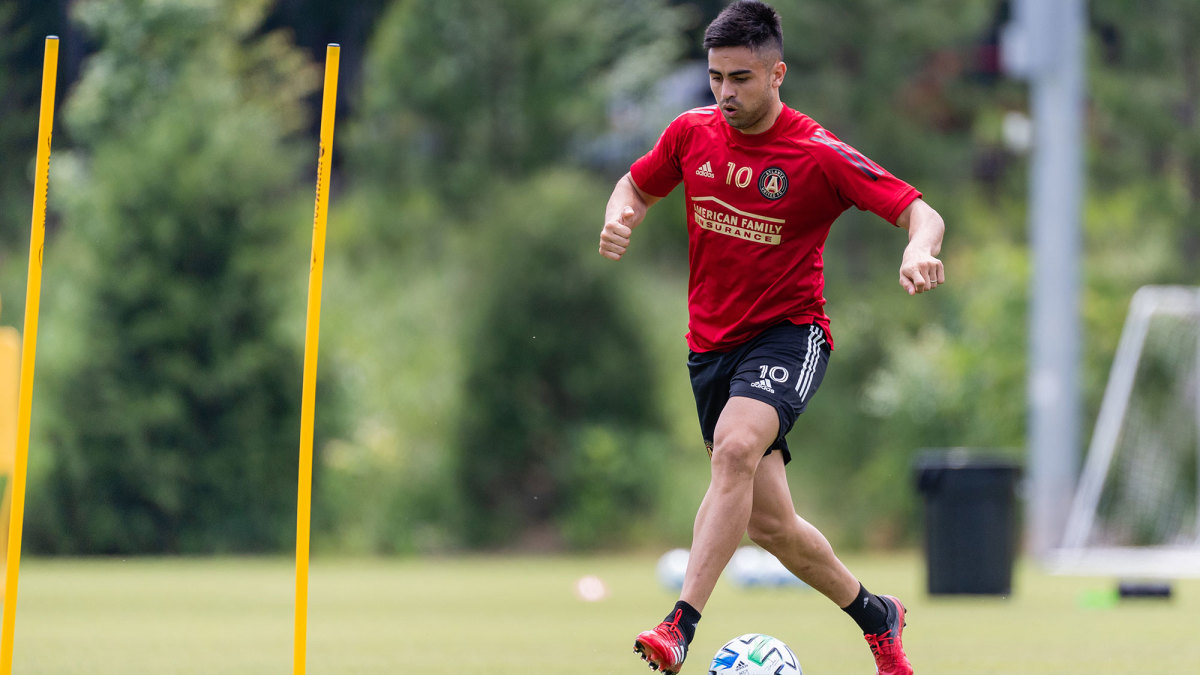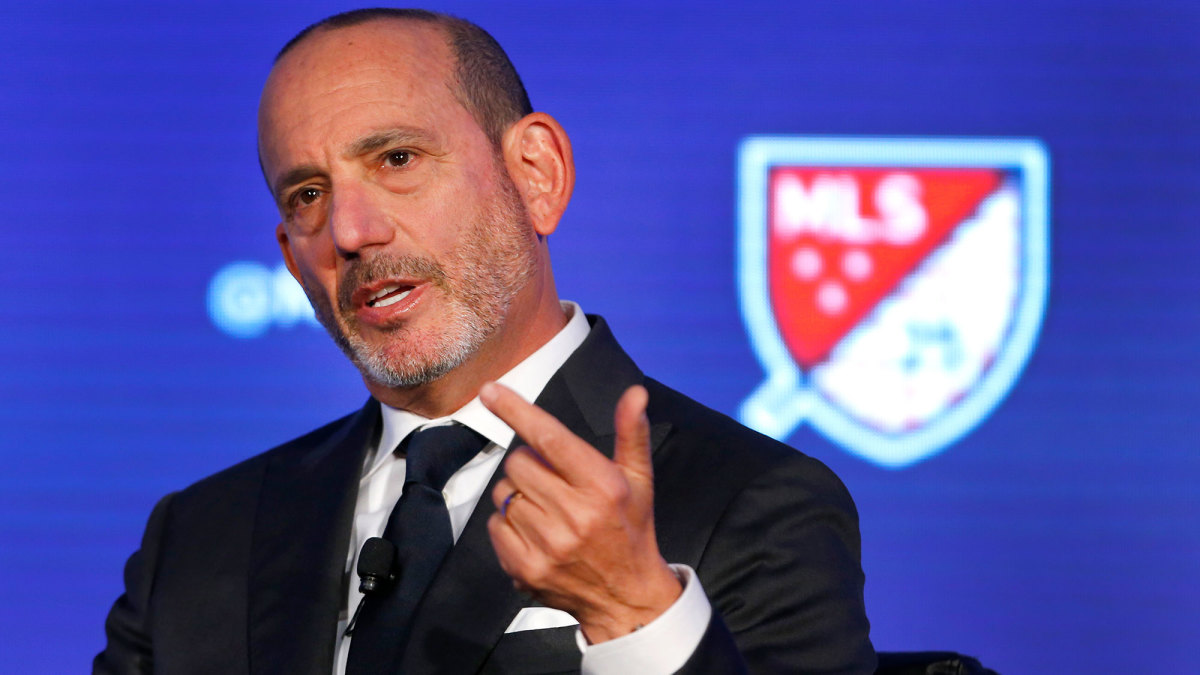What's Known–and What Isn't Yet–About MLS's Return-Plan Tournament
Several weeks before pushing players to reach a deal and return to the field by threatening a lockout, MLS signaled its desperation to resume meaningful competition with what be the most ridiculous press release in its 25-year history.
If you thought the league’s April-May FIFA video game tournament was simply a diversion during the dark days of quarantine (if you were aware of it at all), then think again. After the real player-eMLS player duo representing Atlanta United won the event, MLS issued a release trumpeting Atlanta’s “Fourth Title” in the headline.
So hang that banner, Uncle Arthur! Alongside your MLS Cup, U.S. Open Cup, and whatever the third title is—Eastern Conference? Development Academy? Campeones Cup? The 2019 MLS Marketing Initiative of the Year award?—you’ll be remembered forever as champions of the eMLS Tournament Special Presented by Coca-Cola and PlayStation. We’re assuming the parade will happen once additional social distancing restrictions are lifted.
MLS’s itch is real.
Commissioner Don Garber acknowledged it during a conference call with reporters this week, saying, “Unlike the other leagues, their fan bases are deeply mature and have been around for generations. Our absence has created a void in [our fans’] lives and they love and care for our payers and clubs, but clearly our absence from the sports scene was really crucial to getting back.”
So MLS is investing quite a bit of money, effort and credibility into its upcoming tournament in Orlando, which will mark the league’s official return to the non-virtual field. There may even be some genuine stakes involved. It’ll be a test case for the country’s appetite for MLS on TV following the pandemic pause, as well as for what innovations or access the league might be able to offer once its current broadcast deals expire in 2022.
With so much riding on the project, and with so many potential challenges to overcome, there are bound to be questions and concerns as clubs return to full training and prepare to head to Central Florida on or around June 24. ESPN’s Janusz Michallik reported that an official announcement and details could come as soon as Monday. With that in mind, here’s what we think we know and what we’re waiting to learn, as MLS gets ready to stage a tournament that could end with Atlanta’s second championship of 2020.

The number of games is settled, but the format and timing remain unclear
MLS originally wanted its teams in Orlando for up to 10 weeks, but after negotiations, the time limit for the unnamed tournament (Coronavirus Cup has some alliteration going for it but is kind of macabre) was set by Garber at 35 days. That’s about the length of a World Cup, likely confirming reports that the last teams standing will play seven matches.
Teams may get a few days to acclimate in Orlando before competition begins (each club’s ability to train fully in their own market probably will impact arrival dates).
How will opponents be determined? Dividing the 26 clubs into groups would mean four groups of four teams and two groups of five. In the latter, each team would play three of four potential opponents. MLS could then send the top two finishers in each group, plus the four best third-place finishers, to the single-elimination round-of-16.
The tournament also could mirror the qualification format Concacaf used for its first Nations League, where each team was randomly matched up against three opponents. In other words, there are no groups. With sufficient tiebreakers, a 26-team table would result and the top 16 would move on.
The final likely would be played in early August.
Everyone’s expected, but not everybody’s thrilled
Barring injury or health concerns specific to an individual player, all MLS players currently under contract are expected to participate.
One potential out would be reserved for players who feel uncomfortable leaving behind pregnant partners, according to reports. That could apply to the high-profile Mexican stars of the league’s two Los Angeles teams, Javier ‘Chicharito’ Hernández of the Galaxy and Carlos Vela of LAFC. Galaxy GM Dennis te Kloese has confirmed Chicharito’s participation, according to the Los Angeles Times.
MLS will coordinate a testing regimen and has promised to do everything it can to keep players safe. But the time away, not to mention the lingering threat of the coronavirus, has left some uneasy. Protocols will have to be thorough but reasonable.
“I can tell you they’re taking 2,000 people’s lives into their hands and they better have it sorted,” Atlanta veteran Jeff Larentowicz told the Associated Press. “So it’s on them. We are soccer players and we want to play and it’s their job now to keep us safe.”
Seattle Sounders midfielder Harry Shipp said executives are, “kind of fully acknowledging and understanding that not everyone wants to go. And [it’s not] because they don’t want to play soccer, they just don’t want to go. And I think the league has done a good job of calming any risks, like people being nervous about health risks or medical stuff.”
Conditions won’t be ideal. Orlando and ESPN’s Wide World of Sports facility have the space to live and play. But they’re also in Florida, where July and early August promise tropical heat and humidity (maybe Orlando City will be slightly more comfortable and finally make the playoffs in something). If scheduled with a similar tempo to a World Cup, that means two or three games per day. TV windows will be the determining factor, not the weather. Matches will happen when the networks think people might watch. Perhaps the players can convince MLS to kick off during West Coast primetime.
There’s no official word yet on what happens if a player or players test positive for the coronavirus, nor is there any definitive answer on whether injured players will be sent home or remain quarantined with their team.

MLS has ways to raise the stakes
Garber said there’d be a trophy and $1 million in prize money. So it’s no eMLS Tournament Special. But whether that’s enough to motivate quarantined players during a pandemic remains to be seen. The league also has said that each club’s three first-round games will count in the full-year regular season standings. But when the post-Orlando resumption to play still remains so uncertain, that may mean little to nothing in the grand scheme.
There’s another carrot out there thought, and that’s a spot in the Concacaf Champions League. The Athletic has reported that MLS will award the tournament winner a place in the 2021 CCL. But that possibility raises a few questions prior to official confirmation.
MLS doesn’t have unilateral jurisdiction over CCL spots. Concacaf apportions four to the USA and one to Canada. The American berths are allotted following consultation between the U.S. Soccer Federation and MLS, and then approved by the regional governing body. If Concacaf signs off on admitting the Orlando winner to the CCL, that berth will have to come from somewhere. Typically they’re given to the MLS Cup champ, the U.S. Open Cup champ, and the first-place finisher in each MLS conference following the regular season.
But without knowing whether there will be a 2020 MLS regular season or a 2020 Open Cup, for example, MLS could be robbing Peter to pay Paul. In addition, it’s not clear how MLS can promise a CCL spot to a Canadian club that might triumph in Orlando. Their continental participation is up to the Canadian Soccer Association and its ability to stage the Canadian Championship tournament this year.
The USSF has postponed but not canceled this season’s Open Cup.
Presenting a compelling TV product will be a challenge
MLS struggles with ratings even in the best of times, with full, modern, soccer-specific stadiums and a backdrop of colorful supporters groups. ESPN’s Orlando facility resembles a youth soccer park, with a patchwork of fields bordered by several rows of bleachers. The grass looks good, but the setting is anything but top-tier professional, and making these games appear to be something more than a preseason friendly is going to be tough.
On one level, the tournament will be successful only if everyone gets through it safely. On another level, it’ll be successful only if people watch.
One way to increase interest would be to increase access. Cameras in the locker rooms or microphones on the sidelines might add to the viewing experience and without going into specifics, Garber suggested that MLS is well aware of the challenges and opportunities posed.
“I think our fans, and I think the media and certainly our players, when they see how the games are produced, will be impressed with the technology and the thought that’s gone into trying to test a handful of new concepts,” Garber said this week. “We’ll have more cameras on this broadcast then would be on a typical [game, and] there’ll be more access to audio and video in these broadcasts than in a typical game. We’ll be able to utilize some technology to deliver value to our teams.”
If it looks like two teams wearing all-white uniforms having a scrimmage at a high school, the eMLS championship might wind up being worth more. The quality could suffer as teams return from long layoffs. The whole Orlando operation represents a risk, but it’s one MLS clearly feels it must take. More information on how it’ll all work should come next week.
